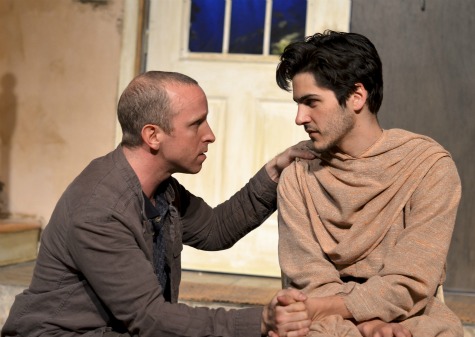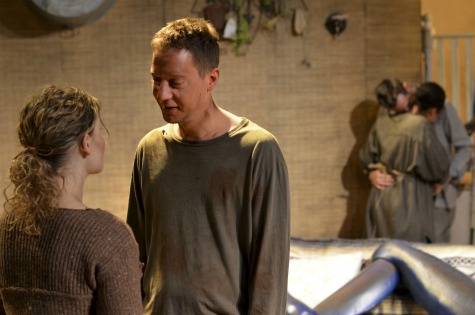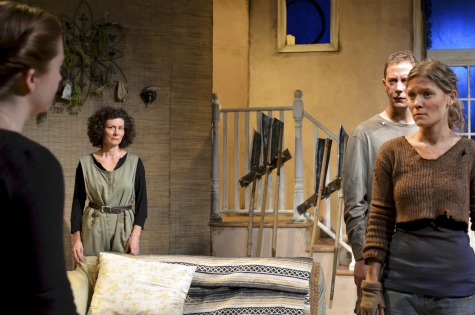Mac Rogers’ new play Blast Radius—the second installment in his sci-fi series The Honeycomb Trilogy—had me on the edge of my seat, and not only because of the giant bugs that took over Earth at the end of the trilogy’s first play Advance Man. Rather, the undeniably human conflicts at the center of the play provide an incredible catharsis that had most of the audience unabashedly crying.
Blast Radius transports us to a time that is equally alien and yet familiar: Set about twelve years after Advance Man, when instead of working symbiotically as promised, the bugs have enslaved humans, outlawed technology, and split up families as well as punished monogamy—all to encourage humans into some approximation of the Honeycomb’s hive mind. And yet, just like in part 1, all of the action takes place in the Cookes’ suburban American home.
Only a few characters have survived in the interim: Siblings Ronnie (Becky Byers) and Abbie (David Rosenblatt) each represent the warring factions, while their sickly mother Amelia (Kristen Vaughan) is an invalid trapped in her former home. And as for charismatic astronaut Bill Cooke, who brought the aliens to Earth? In a daring choice from Rogers, we don’t quite know what happened to Bill, which only emphasizes how insignificant and ant-like these human beings really are.
Human nature and its flaws are at the forefront of Blast Radius, despite its dystopian setting. The impossibly high stakes in this interspecies war only serves to emphasize humans’ ability to compartmentalize, from Ronnie’s decision to get pregnant so she can stay in the women’s building to Abbie’s willingness to turn his back on his family.
To center the action on the Cookes’ home, to focus on the women giving birth to the next generation (and a revolution) instead of explicitly showing us the bugs currently controlling their lives, was a clear decision that Rogers obviously made early in the scripting process. It wouldn’t have been impossible to show us the bugs; as we learned with Qui Nguyen’s She Kills Dragons, puppetry can bring the fiercest creatures into our theaters. But instead, sound designer Jeanne E. Travis has created a masterful soundscape that keeps us on edge with ever-present twitching and skittering of bug legs. And to keep us sated, we get one powerful glimpse of a piece of an alien. It’s a moment that almost wobbles into cheesiness, but amidst all this hushed conspiracy it’s just the reminder we needed of the threat that is, literally, larger than we are.

You might expect a military precision to who takes which side, especially with the highly-foreshadowed schism between Abbie and Ronnie in the first play. However, this isn’t Empire versus Rebel Alliance or humans versus Cylons, even: There are human teams called Nampas who work with the bugs to control the borders, and Abbie himself is one of the most revered Ambassadors. Even though Byers’ fierce, flawed rebel leader is the heart of the story, Rosenblatt makes us care for the villain and even, occasionally, see his side of things.
Abbie’s self-loathing regarding his weak human form is especially engaging as tensions between both races ratchet up and we start to detect whispers of forced integration. His ruminations on the limitations of human love and physical closeness lay the foundation for the play’s central conflict, a reflection of Advance Man‘s message that the only way for any race to survive is through compromise and evolution.
You don’t need to have seen Advance Man beforehand, though that context provides extra texture to the compelling romances: Ronnie’s steadfast loyalty to Peck (Adam Swiderski), and the comfort Abbie finds in an old friend. (Let me just say that it was fortuitous that my friend and I were discussing slash fanfiction right before the lights went out for Act 1.) You know what else is human? Sex, and there’s plenty of it here. The characters’ obsession with clinging to one another and wringing pleasure out of their hard lives—leading to some uncomfortably intimate on-stage simulated sex—actually further illuminates how foreign this future is from our present.

Speaking of human nature: I could not have expected how hard we would all fall for the play’s climax. The themes of sacrifice and loss resonated with me personally as I’m suffering the break-up of a long-term relationship, but in the quiet moments before the end of the show, I was surprised to see and hear the people next to me shaking and sobbing as violently as I was.
This catharsis shouldn’t be missed. I honestly don’t know how Rogers will top this, but I’m champing at the bit for Sovereign, the trilogy’s conclusion, in June. And next time, I’ll be prepared with tissues.
Blast Radius runs through April 14th at the Secret Theatre in Queens (44-02 23rd Street), Thursdays-Saturdays 8 p.m. and Sundays at 3 p.m., plus Monday April 9th at 8 p.m. Tickets are $18, $15 for students and seniors.
Photos: Deborah Alexander
Natalie Zutter is a playwright, foodie, and the co-creator of Leftovers, a webcomic about food trucks in the zombie apocalypse. She’s currently the Associate Editor at Crushable, where she discusses movies, celebrity culture, and internet memes. You can find her on Twitter.










